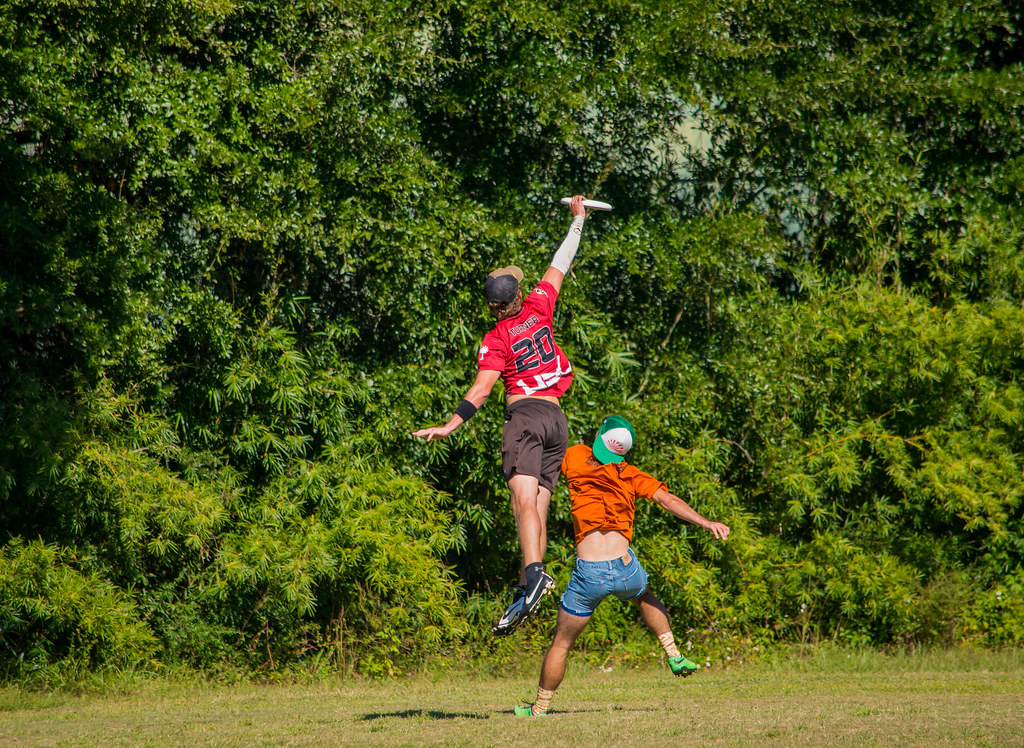Picture this: a high-energy sport where athletes run hard, dive spectacularly, and chase a flying plastic disc with the intensity usually reserved for Black Friday sales. From its beginnings in New Jersey in 1968, Ultimate frisbee is now played by over 70m worldwide. But here’s the twist—the sport has no referees. Zero. Nada.
In Ultimate, players themselves uphold the rules, collaboratively solving disputes on the spot through an agreed set of principles known as “Spirit of the Game”. Imagine bringing that level of trust, fairness, and cooperation into your workplace—without having to chase a Frisbee.
So, What’s the Spirit of the Game?
Ultimate Frisbee’s Spirit of the Game isn’t about group hugs or collective meditation (though feel free to indulge). It’s a set of shared values built on respect, integrity, and mutual accountability. Players not only know the rules—they commit to uphold them fairly, honestly, and collaboratively, even in fierce competition. If a player believes they have been fouled, or there has been an infringement of some kind, they call it out. Then the opposition player involved will either concede, or they will engage in a discussion to sort it out. If they can’t sort it out, then play goes back to where it was before the infraction was called… and EVERYONE accepts it and play continues without grudges being held… because those are the rules.
Translating this into business, it’s easy to see how often the opposite happens. Silos grow taller than the Shard, KPIs clash like rush-hour commuters, and individual agendas sprint past collective objectives. The consequences? Frustration, inefficiency, and goals left as untouched as the last sandwich at a company buffet.
Ditching the Referee Mentality
Businesses love referees—formal processes, rigid structures, strict hierarchies. And while they can occasionally help, they often become crutches that stifle genuine collaboration. If two colleagues can’t work it out… they escalate. As if a boss making the decision is the way to encourage cooperation. By contrast, Ultimate Frisbee’s referee-free environment fosters a deeper understanding of responsibilities and expectations. Players naturally take ownership, recognising that resolving conflicts positively affects everyone involved.
In the workplace, adopting this mindset means empowering teams to solve problems themselves, promoting accountability, and building trust. This doesn’t mean chaos—no one’s suggesting a workplace free-for-all resembling the last biscuit stampede. Rather, it’s about creating a culture where people naturally adhere to shared values because they genuinely understand the importance of collective success.
Building Trust, Not Turf Wars
Imagine your typical organisational conflict: Sales wants speed, Finance craves accuracy, HR values compliance, and Marketing…well, they mostly want prettier slides. Without mutual understanding, these differences spiral into entrenched positions and territorial battles.
Spirit of the Game flips this scenario by emphasising empathy and communication. Ultimate players respect different perspectives, openly discussing disagreements until finding common ground. In business, this translates to more transparent conversations about differing priorities. It encourages active listening and a genuine attempt to understand colleagues’ perspectives. Instead of defending their turf, teams collaborate, knowing everyone’s ultimate aim (pun very much intended) is the company’s success.
Shared Goals, Not Competing Agendas
When was the last time you saw someone in your organisation celebrate another department’s success like it was their own? If you can’t remember, you’re not alone.
In Ultimate, team success is paramount. Individual glory means nothing if the team doesn’t perform. Players recognise that even their toughest competitors share a common goal—enjoying the game and upholding its values. Similarly, businesses can benefit enormously from encouraging cross-departmental collaboration. Sharing objectives rather than pitting teams against each other can dissolve destructive competition, promoting a culture where collective wins are genuinely celebrated.
Learning from Mistakes, Not Assigning Blame
When rules are broken in Ultimate Frisbee, players don’t immediately leap into assigning blame. They talk. They clarify. They move forward. This constructive approach to mistakes helps players learn and prevents future issues.
Contrast this with corporate culture, where blame-shifting can become a competitive sport all by itself. Instead, adopting the Spirit of the Game means approaching mistakes as opportunities for collective learning. It requires a workplace culture that encourages openness and transparency rather than defensiveness and fear of repercussions.
Practising the Spirit of Collaboration
So how do you embed this ethos in your organisation? Start small:
- Model It: Leaders must visibly practise empathy, transparency, and fairness.
- Empower Teams: Give teams autonomy to self-organise and solve problems collaboratively.
- Celebrate Shared Wins: Make it clear that team and company achievements outweigh individual ones.
Encourage Open Dialogue: Foster environments where open communication is normalised, and diverse opinions are respected.
Ready to Play?
Applying Ultimate Frisbee’s Spirit of the Game might not see you leaping gracefully through the air to catch discs, but it could transform the way your teams collaborate. You’ll build stronger relationships, trust, and a culture that thrives on genuine cooperation. And who knows?
Perhaps your next team-building activity might just involve throwing around a frisbee—and seeing firsthand the power of true collaboration. It just so happens that Cognitive Union Founding Partner, Colin Smith, has been playing Ultimate since the 90’s, and knows a thing or two about this stuff. Just mind the office windows.
Cognitive Union is a progressive, boutique learning and performance consultancy. We work with forward-thinking businesses. Transforming their people. Shaping their culture. Helping them embrace change and take on the world. Find this blog useful? Sign up to our email newsletter (bottom of this page) where you can receive articles like this and other insights (not publicly published), and you can also follow us on LinkedIn.

